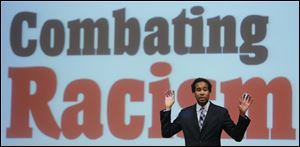
Changing Minds, Changing Lives
White House director: Time to change narrative on race and education
2nd Toledo forum on racism tackles education, achievement gap
1/9/2014
David Johns, left, Executive Director, White House Initiative on Academic Excellence for African Americans, speaks during the Toledo Community Coalition's public forum on combating racism at the University of Toledo, Thursday, Jan. 9, 2014.
Several hundred people braved the elements tonight to attend Toledo's second Changing Minds, Changing Lives forum, and to listen to speaker David Johns as he talked about the importance of acknowledging the excellence in black men and women.
"When people talk about African American kids and education, it's negative," Mr. Johns said. "It's what they are not doing, it's what they are not capable of doing."
PHOTO GALLERY: Click here to view photos from the forum.
It's time to change that narrative, Mr. Johns said, and have real conversations about education and race that may make us uncomfortable, but are necessary.
Mr. Johns, the executive director of the White House Initiative on Educational Excellence for African-Americans, served as keynote speaker for the forum, which was held at Toledo's Nitschke Auditorium and was sponsored by the Toledo Community Coalition and The Blade.
Mr. Johns said that as a child, he was criticized by teachers for wanting to be an astronaut instead of picking up a trade. A guidance counselor told him he didn't appreciate the quantity and quality of colleges to which he applied.
Not enough African-American children are told they can and should go to college. We don't celebrate the high achieving students. Instead, he said, we celebrate kids who can play basketball or football.
Mayor D. Michael Collins helped introduce Mr. Johns, and said the people in the room needed to be missionaries for a better city.
"We have the responsibility to leave this world at the end of our journey in a better place than we've found it," Mr. Collins said.
After Mr. Johns spoke, there was a question-and-answer session with a panel that included Dr. Lloyd Jacobs, University of Toledo president; Toledo Public Schools Superintendent Romules Durant; Jonathan Locust, Ashland University’s director of institutional diversity; Dale Snauwaert, a professor of educational theory and social foundations of education at UT; Hope Bland, a TPS social worker; Susan Brown, chairman of the Bowling Green State University sociology department, and UT student Christopher Scott.
While highlighting the successes of black students is important, panelists and Mr. Johns also discussed the difficulties they face. America has had a significant and persistent achievement gap for decades between minority and white students in academics.
"The fact that it exists is an injustice," Mr. Snauwaert said.
Mr. Johns and panelists also discussed how there is a dearth of African-American teachers, especially men. Young African-American men often don't see examples of people who look like them who are successful.
The forums were motivated by The Blade's publication of "Battle Lines: Gangs of Toledo," a series that started in April and sparked conversations about gangs and race.
The first Changing Minds, Changing Lives forum was in September at Woodward High School and featured Tim Wise, who has studied white privilege and institutional racism. A forum set tentatively for March will look at generational poverty.
Organizers plan to hold additional forums in coming months.
Contact Nolan Rosenkrans at: nrosenkrans@theblade.com or 419-724-6086, or on Twitter @NolanRosenkrans.